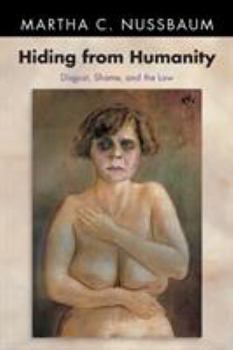Hiding from Humanity: Disgust, Shame, and the Law
Select Format
Select Condition 
Book Overview
Should laws about sex and pornography be based on social conventions about what is disgusting? Should felons be required to display bumper stickers or wear T-shirts that announce their crimes? This powerful and elegantly written book, by one of America's most influential philosophers, presents a critique of the role that shame and disgust play in our individual and social lives and, in particular, in the law.
Format:Paperback
Language:English
ISBN:0691126259
ISBN13:9780691126258
Release Date:January 2006
Publisher:Princeton University Press
Length:432 Pages
Weight:1.36 lbs.
Dimensions:1.1" x 6.2" x 9.2"
Customer Reviews
2 ratings
The Case Against Disgust and Shame As a Basis for Law and Punishment
Published by Thriftbooks.com User , 18 years ago
The thesis presented in this book is relatively simple. Human beings are deeply troubled about being human--being highly intelligent and resourceful, on the one hand, but weak and vulnerable, helpless against death, on the other. We are ashamed of this awkward condition and, in many ways, we try to hide from it. In the process, we develop sentiments such as shame at human frailty and disgust at the signs of our animality and mortality. In addition, we use these two emotions to project our fears on marginalized groups or people who come to embody the dominant group's fear and loathing of its own human frailty. Disgust and shame are therefore two potent human emotions, but they are also problematic and should not be used as a reference in law formulation or legal punishment. On the contrary, law should protect citizens from insults to their dignity such as shaming and scapegoating. Martha Nussbaum describes her book as "an essay about the psychological foundations of liberalism" and she makes great use of experimental data, including materials from child psychology and psychoanalysis, in her analysis of shame and disgust. On the other hand, apart from a few references to Erving Goffman's psycho-sociology of stigma, she doesn't mobilize insights from anthropology and the social sciences, and doesn't attempt to compare the variations encountered by human emotions across cultures. She dismisses Mary Douglass' analysis of purity and pollution as irrelevant to her subject, and makes no reference to Rene Girard's theory of violence and the sacred. Likewise, the conclusions she draws from her analysis of emotions and the law are mostly confined to the American context, and she makes no reference to other legal traditions. Her defense of same-sex marriage or her critique of some aspects of obscenity laws are bound to be provocative. Unfortunately, she tends to dismiss her opponents as falling prey to "moral panic" instead of seriously engaging their arguments. Although I am sympathetic to Nussbaum's liberal agenda, I am not fully convinced by the theoretical foundations of her analysis, and I cannot follow her on some of her conclusions. But Hiding from Humanity nonetheless provides an interesting read. It should be appreciated by all who care about political liberalism and its core ideals of equal respect, reciprocity, and the inviolability of the person.
Excellent!
Published by Thriftbooks.com User , 20 years ago
This is a remarkable book. As a gay man, I found myself saying "thank you" outloud as I finished each chapter. Nussbaum is more than just a wonderful American philosopher, she's a national treasure. If you haven't read her exchange with the, in my opnion, evil philosopher John Finnis, I highly recommend you do. One final point, although I am also a fan of Judith Butler (and I know that Nussbaum and Butler don't always see eye to eye), I see no reason why anyone has to "choose sides." Both of these women are amazing, and both are great to read. The book is very long, which is fine becuase thinkers like Nussbaum have so many interesting ideas and observations on the world we live in. One impression that I got from the book (and this has nothing to do with Nussbaum's own views) is how hard it is trying to come up with a non-theological (that is, non-mystical) argument against homosexuality. Personally, I don't think one can be made -- not a convincing one, at least. Nussbaum co-edited a debate-style book on sexual orientation and American religion, and all the arguments against homosexuality really fell flat and seemed so outdated and almost "hokey." So they really weren't that convincing either. Bottom line is: gays and lesbians have as much right to freedom and the benefits that come with it (marriage, ect.) that straight people do. After all, marriage is all about economic rights and perks whether we want to admit this to ourselves or not. It isn't fair that heterosexuals should have a monopoly on those rights, benefits, perks etc. And besides, who doesn't want gays and lesbians to be in loving, happy, monogamous relationships? And what better incentive is marriage?






